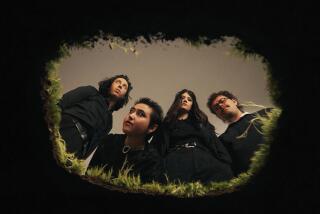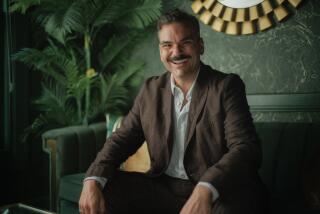FAT BOYS: MORE HERE THAN RAPPIN’
- Share via
“Uh, oh, there’s an eatathon coming up.”
The waiter in the small dining room of a West Hollywood hotel couldn’t resist the quip.
The Fat Boys--the celebrated rotund rappers--had just rumbled in and you couldn’t miss them.
Mark (Prince Markie Dee) Morales is merely big, but Darren (the Human Beat Box) Robinson and Damon (Kool Rockski) Wimbley are humongous.
Notorious for years now within rap circles, these Brooklyn youngsters--Morales is 19; Wimbley and Robinson are 20--have become superstars.
Among their credits: three hit albums, including the current million-seller, “Crushin’,” featuring the riotous rap remake of the surf classic “Wipeout”--co-starring the Beach Boys. They’ve also starred in their own movie, “Disorderlies,” a Three Stooges-like comedy, and are now on a national tour, which includes stops today at the Greek Theatre and Saturday at the Pacific Amphitheatre in Costa Mesa.
Other diners in the hotel dining room seemed to recognize the 1,000-pound trio--and couldn’t stop staring. They knew they were in for a spectacle--the Fat Boys at feeding time. The rappers have been known to put on massive eating exhibitions--junk food mostly--at restaurants. You might say they’ve raised gluttony to an art.
Though they were the center of attention, the Fat Boys didn’t seemed concerned. When the waiter asked for the order, they replied two orange juices plus bacon and eggs. That was just to get their palates working, right?
No, that was the entire order.
“We’ve already had breakfast,” Morales said.
You could almost sense the disappointment in the room when the waiter bought that puny order. The other diners were obviously anticipating a crew of waiters carting in a truckload of food.
But the Fat Boys weren’t themselves that morning. They all seemed to have crawled out on the wrong side of the bed. Robinson, the fattest Fat Boy, didn’t seem to know he wasn’t in bed. He had dozed off.
Morales, the most aggressive and talkative of the bunch, was almost combative when the subject of the “Disorderlies” movie came up. The film is obviously a sore point. It was supposed to make them movie stars.
They had come across so well in the 1985 hit film “Krush Groove” (gorging themselves, of course) that they wound up with a three-picture deal from Warner Bros. “Disorderlies,” their second film, has grossed about $10 million after six weeks in release and does not look to be the group’s hoped-for blockbuster.
“That movie had smash written all over it,” Morales said. “It’s a strong comedy. We can do more than rap. We’re entertainers/comedians. It showed us as great comedians.”
What it really showed is, with the right material and the right approach, they’re promising movie comics. Turning them into the Three Stooges isn’t necessarily the right approach.
Morales continued to grumble: “It was marketed like a rap movie, not a comedy. But it’s not a rap movie. . . .
“Rappin’ in fun but we can go way beyond that,” Morales insisted. “We can be great entertainers. We can do things people don’t realize we can do.”
Wimbley, looking up from his bacon and eggs, started giggling at Morales, whose intensity had mushroomed. Then Morales began giggling too.
Meanwhile, Robinson, with a slight smile on his face, was still dozing.
Morales, Wimbley and Robinson lived on the same block in Brooklyn were they were kids. Rapping was one of their favorite pastimes when they were in their early teens. “We got into rap about 1980,” Wimbley said. “We used to rap on street corners. We’d practice in basements. . . . It was just one of the things we’d like to do together.”
Robinson, who just had awakened, entered the conversation smoothly: “We’d get into all kinds of trouble together. We did wild things, wilder than you can imagine. I love these guys. They’re crazy.”
By 1983, the Fat Boys, originally known as the Disco 3, had sharpened their rapping skills enough to win a rap contest at New York’s Radio City Music Hall. As a result, they met their manager, Charles Stettler, who molded them into stars. After witnessing their eating binges and watching their waistlines expand, he’s the one who convinced them to change their name to the Fat Boys.
Their first album, “Fat Boys”--produced by pioneering rapper Kurtis Blow--showed them to be funny, clever, uninhibited rappers.
“People like us,” Robinson said, “because we’re wild and crazy and we like to have fun. . . . People like people who eat.”
Robinson was nicknamed the Human Beat Box in honor of his unusual skill--providing rhythms by using various gurgling and grunting sounds. He regards himself as weird.
“Sometimes I think I’m crazy, really crazy,” he said, chuckling. “But I really mean it. I laugh too much. I’m not serious. People try to be serious with me and I’m smiling and laughing. I can’t be serious. But I can’t help it.”
Caught up in the spirit of Robinson’s introspective mood, Wimbley said: “I guess I’m strange too. I can’t look at anybody’s face when I talk to them.” He was looking at his plate at the time.
“I’m shy. I don’t talk a lot when I’m not performing. The Fat Boys are supposed to be wild and crazy and confident. People think because you can rap you like to talk all the time. I don’t.”
Robinson then nudged him and they both started giggling. End of serious discussion.
More to Read
Sign up for Essential California
The most important California stories and recommendations in your inbox every morning.
You may occasionally receive promotional content from the Los Angeles Times.













